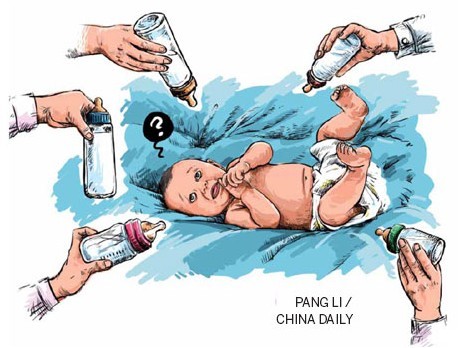

Parents face confusing choices over brand safety and integrity
Any public scandal related to food safety or children is bound to arouse strong emotions, but when it comes to infant milk formula, the impact is not simply doubled, but increased tenfold.
The truth of that statement has been demonstrated by a number of recent scandals in China that have not only embroiled some of the world's leading providers of infant formula, but have also put doctors, hospitals and those in positions of authority on trial.
In mid-September, China Central Television reported that the government in Tianjin had accused doctors and nurses at public hospitals of accepting bribes from Dumex, a French company that makes nutritional products for infants and children.
The payments were made to induce medical staff and hospital authorities to recommend the Dumex brand to new and expectant mothers.
The evidence was compelling and included documents detailing every payment and the names of the medical staff involved. The monthly outlay between January and July was around 300,000 yuan ($49,000), the government said.
Dumex, a household name that entered the Chinese market in the late 1990s, is a unit of Groupe Danone, a Fortune 500 company with a global presence. It has pledged management changes in the wake of the scandal.
Moreover, earlier this year, Danone's Nutricia Advanced Nutrition Unit instigated an internal investigation after it was also accused of bribing doctors in Chinese hospitals to boost sales of its formulas.
Not only has the long-cultivated prestige of these brands been hit hard, but the confidence of millions of Chinese consumers who believed in, and indeed almost seemed to worship, the products, has been destroyed.
The news came five years after China's own domestic baby milk scandal, when a brand of infant formula made by Sanlu Group of Hebei province was tainted with the industrial chemical melamine, ingestion of which can cause cancer at worst, but can also irritate the eyes, skin and respiratory systems.
At least six infants died as a result of ingesting the formula and thousands more were taken ill.
Integrity in doubt
The latest scandals have left a question mark over something that's rarely been in doubt before - the integrity of foreign manufacturers of baby formulas.
In reality, the story may go back further than many imagined. Sales reps for foreign infant formula brands have been "working with Chinese hospitals and doctors right from the start", according to Sui Xiangyu, a milk powder dealer in Beijing who has been in the business for more than a decade and has earned a reputation for being outspoken.
"Back in the 1980s, Chinese people barely knew about formulas, let alone foreign brands. These companies opened up the Chinese market by cooperating with the hospitals," he said. "First, they made the doctors believe in the formula and then reached the parents through the doctors."
At first glance, nothing seems amiss, given that infant formula, although not comparable with breast milk, is widely regarded as the best supplement and, in many cases, substitute for it.
But as an increasing number of foreign brands started to make inroads into the burgeoning Chinese market, a number of unseemly twists and turns emerged.
"The rapid growth of the Chinese market, allied to the fierce competition among the foreign brands, has forced many people to trade their professional ethics for a larger share of the pie," said Sui, referring to the fact that China's infant formula market, currently valued at $12.4 billion, is expected to double by 2017.
"The bait these companies throw out to the medical professionals does not always come in the form of cash," he explained.
Companies bribe hospitals to push baby milk
2013-09-18Danone bribes hospitals to push baby milk
2013-09-17China reiterates infant formula rules
2013-09-18Copyright ©1999-2018
Chinanews.com. All rights reserved.
Reproduction in whole or in part without permission is prohibited.